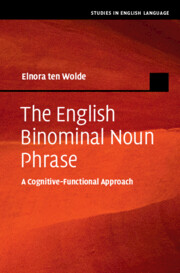Book contents
- The English Binominal Noun Phrase
- Studies in English Language
- The English Binominal Noun Phrase
- Copyright page
- Dedication
- Contents
- Figures
- Tables
- Acknowledgments
- Abbreviations
- Chapter 1 Introduction
- Part I Categorization
- Part II Testing the Hypothesis
- Chapter 6 Diachronic Evidence
- Chapter 7 Premodification Evidence
- Part III Theoretical Analysis
- Part IV Discussion
- References
- Index
Chapter 6 - Diachronic Evidence
from Part II - Testing the Hypothesis
Published online by Cambridge University Press: 29 June 2023
- The English Binominal Noun Phrase
- Studies in English Language
- The English Binominal Noun Phrase
- Copyright page
- Dedication
- Contents
- Figures
- Tables
- Acknowledgments
- Abbreviations
- Chapter 1 Introduction
- Part I Categorization
- Part II Testing the Hypothesis
- Chapter 6 Diachronic Evidence
- Chapter 7 Premodification Evidence
- Part III Theoretical Analysis
- Part IV Discussion
- References
- Index
Summary
Chapter 6 presents a more recent quantitative diachronic study looking for historical evidence for the grammaticalization path presented in Chapter 5. Using data from COHA and COCA, the study examines the development of the first nouns nub, breeze, husk, snake, bitch, and whale. The chapter begins with a discussion of bridging contexts as evidence for the constructional changes. The methodology section provides an explanation for both the choice of first nouns and the choice of corpora. The analysis is broken down into different paths: those first nouns that developed a pseudo-partitive use before the EBNP (nub, breeze, husk, and snake), the pseudo-partitive path, and those first nouns not used in the pseudo-partitive and which developed an evaluative meaning after the EBNP, the evaluative path (bitch and whale). The evidence supports the grammaticalization path proposed in Chapter 5 and indicates that the pseudo-partitive plays only a subsidiary role in this grammaticalization process; it does not appear to be directly linked to the EBNP. The more plausible historical link is between the head-classifier and the EBNP.
Keywords
- Type
- Chapter
- Information
- The English Binominal Noun PhraseA Cognitive-Functional Approach, pp. 117 - 156Publisher: Cambridge University PressPrint publication year: 2023



